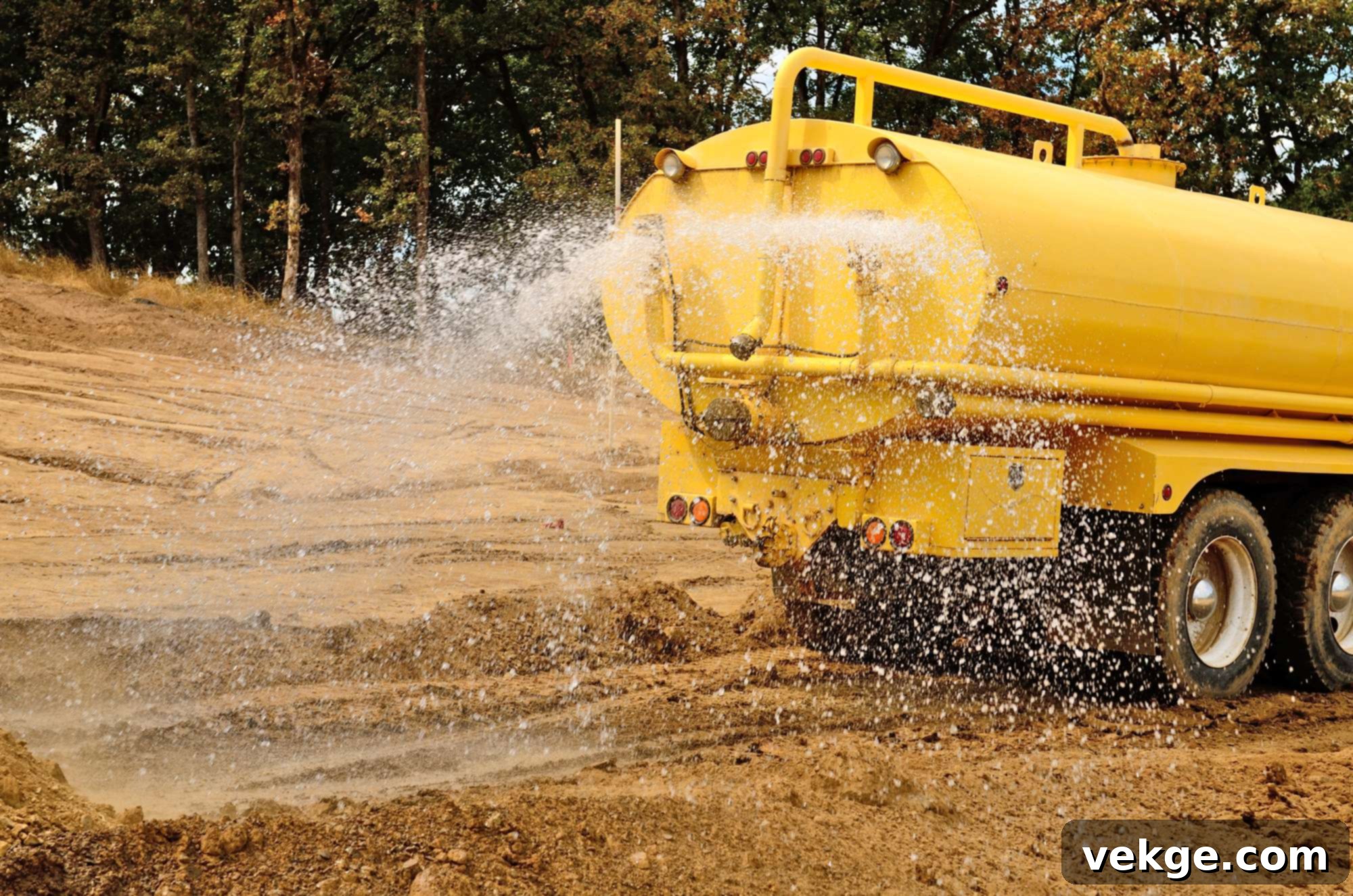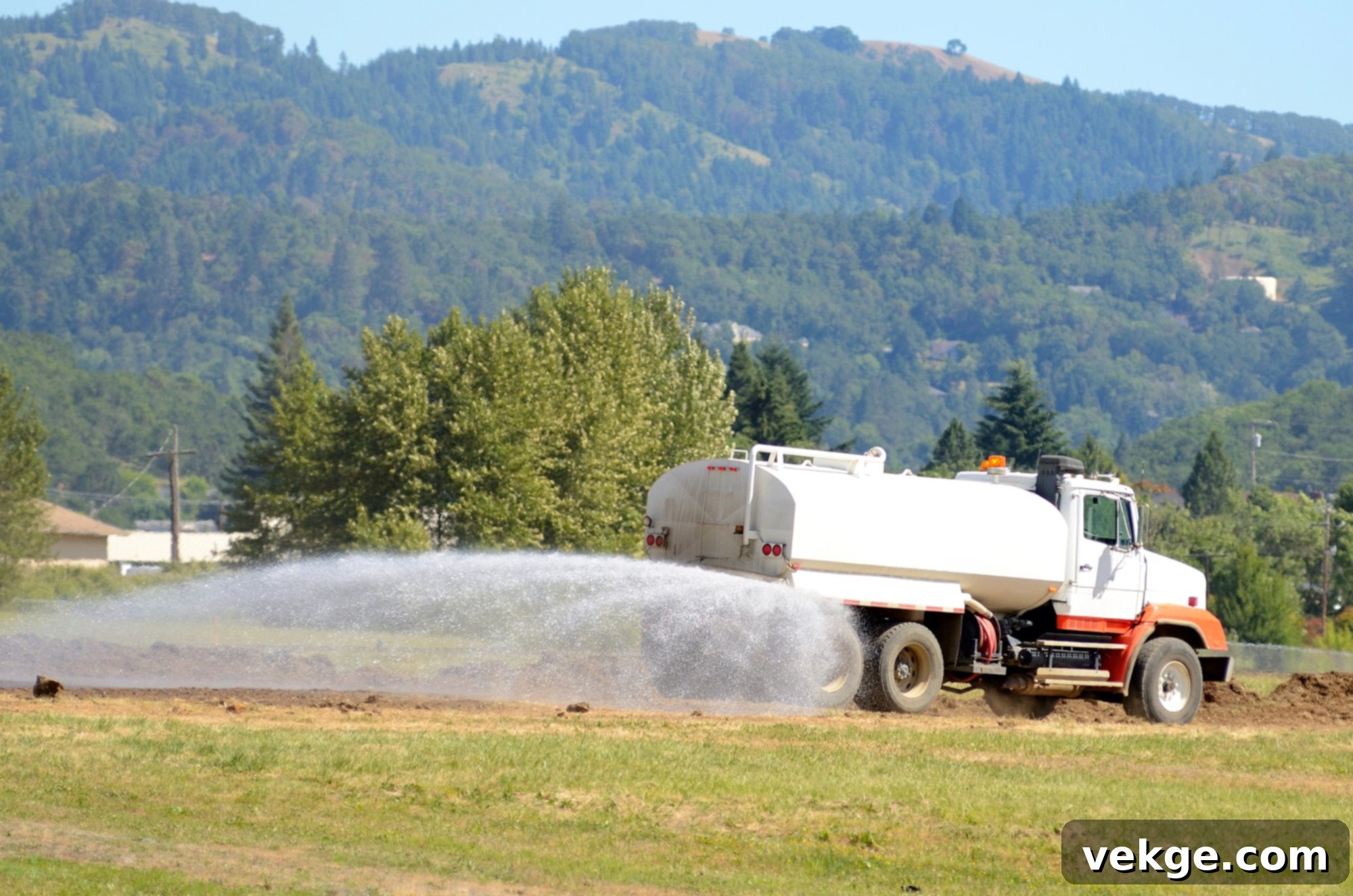The Indispensable Versatility of Water Trucks: Comprehensive Applications Across Industries
Water trucks are often seen as simple workhorses, typically associated with dusty construction sites or large-scale fire control efforts. However, this perception barely scratches the surface of their true capabilities. These highly adaptable machines play a crucial, multifaceted role across an impressive array of sectors, quietly contributing to environmental safety, agricultural productivity, infrastructure development, and even recreational activities.
Far from being single-purpose vehicles, modern water trucks are engineered to perform a diverse range of tasks that are essential for keeping businesses thriving and communities running smoothly. Their ability to efficiently transport and distribute water makes them indispensable tools in scenarios as varied as ensuring public health through dust suppression, supporting crop growth in arid regions, and providing critical aid in emergency situations. This article will delve into the extensive and often surprising applications that underscore the unparalleled versatility of water trucks.
Understanding Water Trucks: Core Components and Customization
At their core, water trucks are specialized heavy-duty vehicles equipped with large, robust tanks designed for the safe and efficient transport and distribution of water. Beyond the tank, these machines are outfitted with powerful pump systems, various sprayers, and often specialized nozzles that facilitate precise and controlled water distribution.
The adaptability of water trucks from Welding Solutions, for example, highlights their crucial role as versatile assets across numerous fields. These vehicles come in a wide range of sizes and capacities, from smaller models suitable for urban projects to massive off-road units designed for mining operations or large agricultural estates. Their design can accommodate diverse requirements, including navigating challenging terrains, handling different types of water (potable, non-potable, recycled), and performing specific tasks such as high-pressure washing or controlled misting. This inherent versatility ensures that water trucks can be meticulously tailored to meet the unique and evolving needs of virtually any industry.
Water Trucks in Construction and Infrastructure Development

Essential for Dust Control and Soil Compaction
Perhaps one of the most widely recognized and critically important functions of water trucks in the construction sector is their role in dust control. Construction sites are notorious for generating significant amounts of airborne dust, which poses substantial health risks to workers, nearby residents, and the surrounding environment. Inhaling dust particles can lead to respiratory illnesses, and excessive dust can obscure visibility, increasing the risk of accidents. Furthermore, strict legal and environmental regulations increasingly mandate effective dust mitigation strategies.
Water trucks play a vital role in addressing these challenges by systematically spraying water to suppress dust particles, binding them to the ground and preventing them from becoming airborne. This not only enhances safety and compliance but also prolongs the lifespan of heavy machinery by reducing abrasive wear caused by dust.
Another crucial construction-related application is soil compaction. Achieving proper soil density is fundamental for the structural integrity of any construction project, from building foundations to roadbeds. Water is applied to help bind soil particles, creating a more stable and cohesive ground. Without the precise application of moisture, compaction processes can be inefficient, leading to unstable foundations, uneven settling, and ultimately, compromises to the project’s long-term durability and safety. Water trucks ensure that the soil reaches optimal moisture content for effective compaction, creating a solid base for all subsequent construction work.
Building Better Roads and Durable Infrastructure
Water trucks are indispensable throughout the various stages of road construction and maintenance. They are regularly employed to prepare the ground for paving by ensuring the base materials, such as aggregate, maintain a consistent dampness. This precise moisture level is crucial for achieving the desired density and stability of materials, which is absolutely essential for creating durable, resilient, and long-lasting infrastructures that can withstand heavy traffic and environmental stressors.
Beyond road construction, water trucks are also vital in large-scale infrastructure projects, including airport runways, bridges, and large commercial complexes. They can be used for curing concrete, preventing it from drying too quickly and cracking, thereby ensuring maximum strength and longevity. Similar processes apply within mining operations, where water trucks are critical for keeping dust under control on haul roads, maintaining safe pathways for heavy machinery and transportation, and supporting various stages of mineral processing.
Agriculture: Facilitating Growth and Sustenance with Water Trucks
The pivotal role of water trucks extends significantly beyond soil preparation, reaching deep into the heart of agricultural sectors. These vehicles are invaluable assets when it comes to irrigation, particularly in regions grappling with water scarcity or those that lack sophisticated fixed irrigation systems. Their ability to deliver water precisely where and when it’s needed can be a game-changer for crop yield and livestock health.
Efficient Crop Irrigation and Nutrient Delivery
Not every farm or agricultural plot has access to a dedicated, extensive irrigation system, especially in remote or newly developed areas. This is where water trucks become a godsend, efficiently transporting water to fields that desperately need it. They are essential for sustaining crop growth during prolonged periods of drought, or in locations where consistent water supplies are challenging to access. This targeted irrigation helps prevent crop failure, ensuring food security and economic stability for farmers.
Furthermore, water trucks can be equipped to distribute not just water, but also liquid fertilizers or soil amendments. This allows for precise nutrient delivery directly to the root zones of plants, optimizing growth and reducing waste. For newly planted saplings or specialty crops, the controlled application of water and nutrients can significantly improve survival rates and overall yield, making these trucks crucial tools for modern farming practices.
Livestock and Ranch Management
On livestock farms and vast ranches, water trucks are fundamental for ensuring that animals have consistent access to clean and adequate drinking water. This is vital regardless of the pasture’s distance from a natural water source or well, and it becomes especially crucial during arid seasons, unexpected dry spells, or when traditional water lines fail. The health and productivity of livestock are directly linked to their hydration levels, and water trucks provide a reliable solution.
Beyond drinking water, water trucks have applications in maintaining green pastures, which are essential for animal grazing and overall well-being. They can also be used for cleaning pens, cooling animals during extreme heat events, and providing emergency water for wash-down procedures, thereby contributing significantly to animal welfare and farm hygiene.
Firefighting: An Unconventional Yet Critical Role

While one might not immediately associate standard water trucks with frontline firefighting, they provide crucial, often life-saving support in combating fires, particularly in remote or rural areas that lack easy access to conventional hydrants or sufficient water pressure. Their large carrying capacity makes them invaluable in situations where a continuous supply of water is paramount.
Vital in Wildfire Control and Suppression
Given the increasing occurrences and intensity of wildfires globally, water trucks have emerged as unexpected yet invaluable assets in supporting firefighting efforts. They transport substantial water supplies directly to the front lines, acting as mobile reservoirs for smaller fire engines or directly attacking less intense flames. They assist in keeping fires at bay by building water boundaries and wetting vegetation to slow the spread of advancing flames, often forming critical defensive lines to protect communities and natural habitats. These trucks are instrumental in initial attack strategies, as well as in “mop-up” operations after a fire has been largely contained, ensuring no embers reignite.
Enhancing Firefighter Training Exercises
Beyond active fire suppression, fire departments also extensively utilize water trucks during training exercises. These vehicles enable departments to simulate realistic emergency scenarios efficiently, providing a safe yet challenging environment for trainees. This setup maximizes safety while allowing aspiring and experienced firefighters to develop and refine essential firefighting skills, practice equipment deployment, and understand the dynamics of water distribution in high-pressure situations, ultimately improving their readiness for real-world emergencies.
Environmental Management: Preserving Nature and Mitigating Hazards
Water trucks provide indispensable assistance in environmental management, playing a critical role in preserving natural areas, mitigating pollution, and contributing to ecological health and restoration efforts. Their precise water delivery capabilities make them effective tools in various environmental protection applications.
Pollution Control and Remediation Efforts
Water trucks are pivotal in controlling air pollution by preventing particulates from becoming airborne, especially in industries that generate significant dust, such as mining, quarries, demolition sites, and landfills. By regularly wetting down surfaces and stockpiles, they effectively reduce the release of hazardous dust into the atmosphere, improving air quality and protecting public health.
In environmental remediation projects, water trucks deliver essential resources directly to areas recovering from ecological degradation. This can involve maintaining optimal moisture levels for revegetation efforts on disturbed lands, assisting in the stabilization of landfill sites to prevent erosion and dust, or aiding in the containment and clean-up of spills. Their application ensures moisture levels remain adequate for both plant recovery and overall landscape stability, accelerating the healing process of damaged ecosystems.
Entertainment and Sports: Unexpected Utility
The reach of water trucks extends even into the dynamic worlds of entertainment and sports, where their capabilities are called upon for a variety of unique and specialized reasons that enhance experiences and ensure safety.
Supporting Film and Event Productions
In large-scale productions, whether for film shoots, outdoor festivals, or major concerts, water trucks are creatively deployed. They are used to control dust in open-air venues, create realistic rainy scenes for cinematic effects, or even produce atmospheric fog. Furthermore, they contribute significantly to attendee comfort by cooling grounds and crowds during hot weather, cleaning common areas, and assisting with sanitation support. They provide tangible benefits in enhancing special effects or maintaining desired environmental conditions, crucial for successful and enjoyable outdoor events.
Optimizing Sporting Events and Venues
In sports that rely on specific ground conditions, such as motocross, dirt track racing, equestrian events, or even baseball, water trucks are crucial for optimizing the venue. They damp down tracks and fields to achieve precise moisture levels for safety and competition. The right moisture content can significantly enhance grip for vehicles and horses, reduce dust for both competitors and spectators, and minimize hazards, ensuring that athletes can perform at their best while maintaining a safe and enjoyable environment for everyone involved. For golf courses, they can ensure specific turf conditions for tournaments, and for ice rinks, they might assist in preliminary flooding.
Renting or Purchasing Water Trucks: Making an Informed Decision
For industries and businesses that frequently require the use of water trucks, the strategic decision to rent or purchase these essential assets depends on several key factors, including project duration, budget, utilization rates, and long-term operational goals.
Renting: Ideal for Short-Term or Sporadic Use
Renting water trucks offers exceptional flexibility and cost-effectiveness for temporary, seasonal, or one-off projects. Many businesses find renting highly beneficial when their water truck needs are not consistent or long-term. The advantages include avoiding significant upfront capital expenditure, eliminating the burden of maintenance costs, storage, and depreciation, and gaining access to a wide range of models and capacities without a permanent commitment. This option allows businesses to scale their equipment needs up or down rapidly in response to project demands, ensuring they always have the right tool for the job without the long-term responsibilities of ownership.
Purchasing: A Strategic Investment for Long-Term Application
On the other hand, purchasing water trucks represents a strategic long-term investment for companies that have a consistent, year-round need for these versatile machines. Owning a truck provides immediate availability, allows for complete customization to specific operational requirements, and can offer cost savings over time if utilization rates are high. It also provides an asset for the company’s balance sheet, potentially offering depreciation benefits. Businesses that integrate water management as a core part of their daily operations, such as large construction firms, mining companies, or municipal services, often find that the benefits of ownership far outweigh the initial investment and ongoing maintenance responsibilities. Understanding the detailed cost-benefit ratio of renting versus purchasing helps businesses make informed decisions tailored precisely to their unique operational needs and financial strategies.
Maintenance and Operation of Water Trucks: Ensuring Longevity and Efficiency
To keep these sophisticated machines in optimal condition and ensure their maximum effectiveness and longevity, regular, diligent maintenance and a thorough understanding of their operation are absolutely crucial. These factors directly impact safety, performance, and operational costs.
Rigorous Regular Maintenance Protocols
Routine checks and servicing of all critical components – including the pump systems, internal and external tank integrity, sprayers, nozzles, filters, and the vehicle’s chassis and engine – are paramount to keeping water trucks functioning efficiently and reliably. Preventative maintenance not only minimizes unexpected downtime and costly repairs but also significantly extends the vehicle’s operational lifespan. Adhering to manufacturer-recommended service schedules, promptly addressing minor issues, and performing daily pre-trip inspections ensure constant readiness for deployment and prevent small problems from escalating into major failures.
Empowering Through Knowledgeable Operation
Training operators on the correct, safe, and efficient usage of water trucks is just as important as mechanical maintenance. Skilled and knowledgeable personnel are essential for maximizing the impact of these vehicles’ capabilities, promoting site safety, and preventing accidental damage or misuse. Proper training covers everything from safe driving practices, understanding different spray patterns and pressure settings, efficient water usage techniques, environmental considerations, and basic troubleshooting. Trained operators are better equipped to handle diverse situations, reduce the risk of mechanical issues arising from inappropriate handling, and contribute to a more productive and safer work environment for everyone.
Conclusion: The Undeniable and Evolving Versatility of Water Trucks
In conclusion, the expansive array of tasks that modern water trucks are expertly designed to handle unequivocally demonstrates their indispensable value across an astonishing number of industries. Far from being confined to singular applications, these versatile machines have carved out critical roles in diverse sectors, far surpassing their traditional uses.
From stabilizing vast construction sites, meticulously controlling dust and aiding in soil compaction, to supporting essential agricultural practices through efficient irrigation and livestock management, their contributions are foundational. Furthermore, their crucial role in safeguarding the environment through pollution control and remediation, providing vital support in firefighting efforts, and even enhancing the safety and experience of entertainment and sporting events underscores their adaptability. As industries evolve and challenges intensify, the demand for adaptable and efficient water management solutions will only grow, cementing the water truck’s status as an enduring, indispensable, and truly versatile asset in our modern world.
